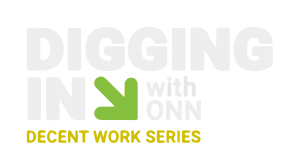
Blog
How the federal charity reform process can be enriched by provincial and regional nonprofit networks – Archived Content
Big changes may be coming to how Canada regulates charities. Prime Minister Justin Trudeau specified in his mandate letter to the minister of national revenue to “modernize the rules governing the charitable and not-for-profit sectors” and to clarify the rules governing “political activity,” proposing that “a new legislative framework to strengthen the sector will emerge from this process”. It is easy to understand why national charities, networks, umbrella groups, and foundations must be engaged in federal policy given their national perspective, and recently, at the Ontario Nonprofit Network 2016 conference, I was reminded how important it is for regional and provincial nonprofit networks to be part of this process too.
As a provincial network of nonprofit organizations focused on policy, advocacy, and services to create positive change for Ontario’s nonprofits and charities, the Ontario Nonprofit Network (ONN)’s network of 7,000 includes nonprofit organizations of all sizes and subsectors across the province. Its conference presenters tackled a variety of topics including decent work, social procurement, and evaluation in the nonprofit sector in Ontario.
ONN is one of several provincial and regional nonprofit networks in Canada that are advancing policy agendas for their communities. Other examples include Calgary Chamber of Voluntary Organizations and the Centre for Community Organizations in Quebec. So how can, and do, strong regional and provincial networks contribute to the national discussion about modernizing the rules governing charities?
Here are a few reasons why provincial and regional networks have a role to play:
Changes to the definition of a charity could broaden the pool
Current discussions linked to charity reform include questions about the very definition of charity and charitable activities (Juneau, 2016). Changing these definitions could open up the possibility for some nonprofit organizations to become registered charities. When discussing charity reform it is obvious that charities should be engaged – but what are the implications for nonprofits? ONN and other nonprofit networks include not only registered charities, but also the breadth of nonprofit organizations in Canada. Nonprofit networks can offer a wealth of information and perspectives to consider that are not part of the existing conversation among charities.
Federal policy with provincial and municipal implications
The Prime Minister’s mandate letter also emphasizes that the new legislative framework for charities will address the rules governing political activities and recognize charities’ important contribution to public debate and public policy. Imagine Canada’s recent Sector Monitor report reveals that two-thirds of charities are involved in some sort of public policy activity, and approximately 80% of that activity is focused on municipal and provincial governments. While aspects of policy advocacy may be regulated at a federal level, the implications also affect the public policy activities that charities are carrying out at every level government. Provincial and regional networks that advocate at these levels can therefore provide important insight in how to ensure charities can fully participate in public policy processes. As Noah Zon of Maytree noted at the ONN conference, there is a role for nonprofits to play throughout the public policy process, from defining the problem, to developing solutions, to testing and evaluating them.
Relationships with local representatives and other potential allies
Members of Parliament listen to their local constituents. If the nonprofit sector wants to get MPs’ attention, organizations need to speak to their local representatives, as well as communicate to constituents how supporting charities affects their community. Hilary Pearson of Philanthropic Foundations of Canada and Bruce MacDonald of Imagine Canada emphasized this need for local feedback on the “Federal At Issue” panel at the ONN conference.
Regional and provincial governments also have an influential voice in Ottawa. Pearson suggested that the Province of Ontario could be an ally in federal conversations given that Ontario tackles similar issues, such as strengthening social finance policy.
Overall, provincial and regional networks can help demonstrate how federal issues will impact local communities. They have relationships with the provincial government, local MPs, and organizations on the ground that work in local communities.
Engaged and diverse membership
Collaboration with provincial and regional networks will assist in gathering perspectives from a broad array of organizations. ONN and other networks have connections to organizations, large and small, from a variety of subsectors. The perspectives of smaller grassroots organizations are vital to advancing charity reform that is reflective of their needs.
Collaboration and discussion across national, provincial, and regional networks and organizations is already happening for these very reasons. National networks and organizations have a federal vantage point: they can see trends happening across communities and jurisdictions and identify common areas to address. Provincial and regional networks have mobilized members, diverse perspectives, and community relationships to contribute to these conversations.
What does this mean for your organization? Harness your vantage point and engage in the conversation.
As we were reminded throughout the ONN conference, networks are only as strong as their members. Participate or, if needed, start a conversation within your network about how the current legislative framework impacts your organization and what changes would positively impact your community.
We have limited time to define what we want as a sector and move forward. As many panelists and participants expressed throughout the ONN conference, seeking consensus is not always realistic. The conference session by Liz Rykert of Meta Strategies about networks recommended the GEPO strategy: Good Enough Push On. The nonprofit sector represents so many different organizations and perspectives – we need to listen to one another and then move forward in the short time we have.
Additional resources
– The Canadian income tax act and the concepts of charitable purposes and activities, by Carl Juneau, The Philanthropist
– Imagine Canada’s Sector Monitor, by David Lasby and Emily Cordeaux
– Growing a regional nonprofit network
– Chatham-Kent Nonprofit Network
– Pillar Nonprofit Network
– Toronto Nonprofit Network
– ThePhilanthropist.ca | Subscribe


